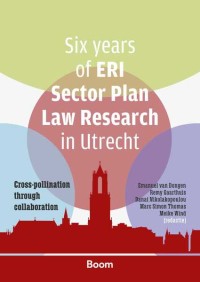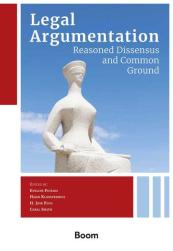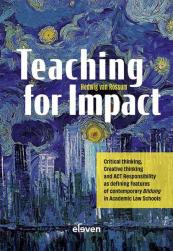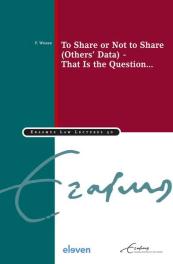Six years of ERI Sector Plan Law Research in Utrecht
Cross-pollination through collaboration
Resultaten van het Utrechtse Sectorplan Rechtsgeleerdheid
Deze bundel toont en viert het werk dat onder het Utrechtse Sectorplan Rechtsgeleerdheid is verricht. Sinds de start van het eerste Sectorplan Rechtsgeleerdheid in september 2019 hebben onderzoekers baanbrekend onderzoek verricht en intensief samengewerkt aan maatschappelijk relevante thema’s. Het onderzoek richtte zich op twee hoofdthema’s: Institutions for Conflict Resolution en Empirical Legal Research. Deze thema’s zijn samengebracht in het cross-over onderzoekscluster Empirical Legal Research into Institutions for Conflict Resolution (ERI). Collectieve samenwerking stond centraal: binnen het onderzoeksnetwerk zelf, maar ook internationaal en interdisciplinair.
Diversiteit in ERI-onderzoek
De bundel laat de veelzijdigheid van het ERI-onderzoek zien, met bijdragen uit verschillende rechtsgebieden, uiteenlopende methodes en teksten in zowel het Nederlands als Engels. Zo zijn er hoofdstukken over empirische methodologie, waarin onderzoekers hun ervaringen delen en de meerwaarde van empirische methoden in het recht toelichten. Daarnaast biedt de bundel hoofdstukken waarin empirische methodologie wordt toegepast op juridische vraagstukken. Tot slot werpen enkele hoofdstukken licht op verschillende instellingen voor conflictbeslechting.
Inzichten in conflictbeslechting en empirisch-juridisch onderzoek
Deze bundel biedt een waardevol overzicht van recente wetenschappelijke inzichten op de gebieden conflictbeslechting en empirisch-juridisch onderzoek. Het boek is interessant voor zowel academici – onderzoekers en studenten – als voor praktijkbeoefenaars.
Achievements of the Utrecht Law Sector Plan
Six years of ERI Sector Plan Law Research in Utrecht: Cross-pollination through collaboration is a volume created to showcase and celebrate the work accomplished under the Utrecht Law Sector Plan. Since the start of the first Sector Plan Law in September 2019, researchers have engaged in innovative research and intensive collaboration on socially relevant topics. The research has focused on two main themes: Institutions for Conflict Resolution and Empirical Legal Research. These two themes have been combined in the cross-research cluster Empirical Legal Research into Institutions for Conflict Resolution (ERI). Collective collaboration has been key: within the research network itself, but also internationally and interdisciplinary.
Diverse contributions to ERI research
This volume reflects the diverse nature of ERI research, featuring contributions from various legal fields, using various methods, and written in both English and Dutch. It contains chapters on the empirical methodology itself, including lessons from researchers’ own experiences and the benefits of empirical methods in law. Furthermore, the volume presents chapters that use empirical methodology to research legal problems. Finally, some chapters shed light on various institutions for Conflict Resolution.
Insights into Conflict Resolution and Empirical Legal Research
This volume provides a valuable overview of recent scientific research for everyone interested in the fields of conflict resolution and empirical legal research. It appeals both to academics – researchers and students alike – as well as to practitioners.










